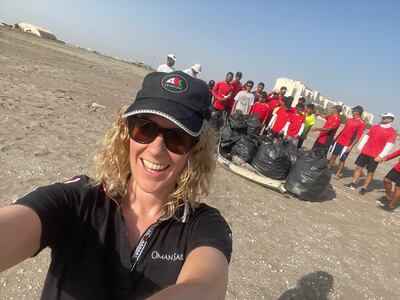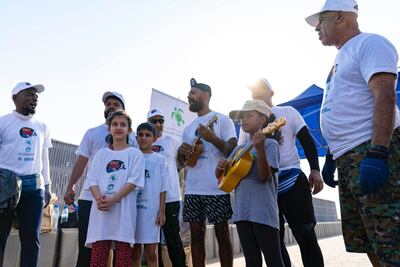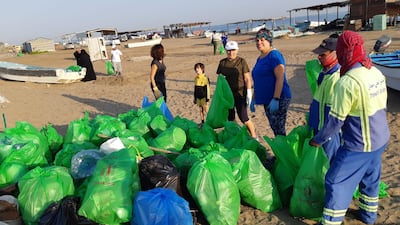In a land of breathtaking landscapes and pristine coastlines, three passionate environmental activists are championing the cause of conservation to ensure the preservation of these treasures for generations to come.
Stretching from Musandam to Salalah, Oman's captivating, undulating shores and azure waters beckon visitors from the world over.
Fahad Al Abri, a native Omani, has transformed music into a powerful instrument for change.

His song Matloob lil Adala, translated from Arabic as “wanted for justice”, is a resounding message against littering and the significance of beach clean-ups.
This composition marked the genesis of Al Abri's journey from musician to environmental advocate.
His "move_green" Instagram account has blossomed into a virtual hub of eco-consciousness, gathering more than 5,000 followers.
“I am a musician and a fitness trainer. When I take my clients outdoors for personal training to some beautiful spots, the last thing I want to see is trash tarnishing these scenic locations,” Al Abri says.
Now his “Musical Beach Clean-up” events have evolved into joyful gatherings where hikers, athletes, and everyday people unite to protect the landscapes they cherish.
The attendances, at times approaching 180 participants, underscore Al Abri's ability to rally communities round a shared environmental purpose.
Going beyond the shores, his influence extends to international platforms. His Arabic TED Talk embodies his commitment to channel music for positive behavioural shifts.
Collaborations with organisations such as Outward Bound Oman and campaigns with the Environmental Society of Oman solidify Al Abri's role as a unifying force in the global fight for environmental well-being.
British activist Debbie Richardson is a sustainability leader at Oman Sail, a national initiative in the sultanate that promotes sailing and marine activities, develops local talent in the field of sailing and highlights Oman's rich maritime heritage.
A strong advocate against single use plastic and with a geography degree from Royal Holloway, University of London, Ms Richardson's philosophy of “leave only footprints on the beach” guides her actions, epitomising responsible living.
Her global travels highlighted the pervasive issue of single-use plastics, propelling her to steer change in the country she has called home for seven years.
The pinnacle of her leadership emerged during the 2021 Youth Sailing World Championships, culminating in a Guinness world record for the “Most Nationalities Collecting Litter”.
This milestone, uniting 73 nationalities who collected more than 344kg of litter at Musannah public beach, was a clarion call to confront the menace of plastic pollution.
At all Oman Sail's events, the organisers complete a beach clean-up and provide sailors and guests with reusable water bottles, teaming up with water companies to provide water using five-gallon dispensers.
When is comes to responsible tourism, Ms Richardson emphasises the importance of eco-friendly practices by hotels, particularly energy conservation and sustainable food sourcing.

“Hotels need to shout about how they are protecting the environment, as more and more international tourists seeking an adventure holiday in Oman are now asking questions to know that their trip is as eco-friendly as it should be,” Ms Richardson says.
Through her environmental work, she hopes to increase awareness of the dangers of single-use plastic. Her dedication to nurturing environmental consciousness in younger generations ensures that her efforts will leave an enduring legacy.
The transformative journey of another activist, Ammu Raveendran, was sparked by the catastrophic floods that in 2018 ravaged her home state of Kerala in India.
Those events shaped a determination to play a role in environmental conservation, giving birth to the “Save Oman Beaches” initiative. The resonance was swift, leading to community-driven beach clean-ups that transcended boundaries.

The effects of her work extend beyond the shoreline. The clean-ups, often accompanied by awareness campaigns, have led to grass-roots movements. Notably, the clean-up on Masirah Island inspired a local commitment to regular beach cleaning.
“As individuals sharing planet Earth with other living beings, it is our responsibility to make a shift in our attitudes and commit to environmental safety. Every day presents an opportunity to discontinue the use of any item that poses harm to the environment,” Ammu says.
Beyond clean-ups, Ms Raveendran's endeavours encompass tree-planting initiatives and engagement with the fishing community. With an impressive record of 162 clean-ups, her journey exemplifies the ripple effect that individual commitment can generate.
Harmonising for a cleaner tomorrow
Fahad Al Abri, Debbie Richardson and Ammu Raveendran, bound by their commitment to beach clean-ups, have woven a narrative of environmental conservation that resonates through Oman's landscapes.
Their collective efforts underline that beach clean-ups are not just about picking up litter – they are about raising awareness, forging community bonds, and inspiring change.
“In my opinion educating the youth is a key factor to make life choices that are sustainable and ensure their environment is protected for their children's’ children,” Ms Richardson says.

